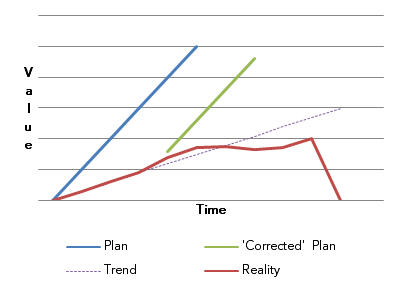 At the precipice of change, we are getting sentimental here at the Oh! Network.
At the precipice of change, we are getting sentimental here at the Oh! Network.
As a developer joining Oxygen NY in 2001, I entered a code and fix culture under a facade of waterfall planning. I fought arbitrary dates, bloated specifications, and reality-challenged reporting. I acquired a survivalist’s skill for landing valuable projects and picking co-workers who helped carry them to completion.
As team lead, I made myself project manager. I used a risk-managed, iterative approach based on Steven McConnell’s Software Project Survival Guide and Earned Value Planning. We provided transparency, met dates and exceeding expectations.
Still, I had the awful, lonely feeling it was unsustainable. A tiny team, we were isolated from each other. We needed a collaborative practice. We needed to share knowledge, commit to a common way of working, and lift each other past our individual limitations.
I found the following e-mail thread capturing the moment we adopted Extreme Programming (XP). A bit of everyman’s history with a very small ‘h’…
From: Ken Judy
Sent: Tuesday, January 13, 2004 2:40 PM
To: Luke Melia; Kristofor Selden
Cc: Steve Morgan
Subject: Agile Methodologies
Here are sites for different agile methodologies. Of the five of them, XP is the most exacting. The others are generally light frameworks for ways of developing or managing projects that support the agile manifesto http://agilemanifesto.org/.
XP: http://www.extremeprogramming.org/
Scrum: http://www.controlchaos.com/
Crystal: http://alistair.cockburn.us/crystal/crystal.html
Adaptive Software Development: http://www.jimhighsmith.com/
Feature Driven Dev: http://www.featuredrivendevelopment.com/
— Ken
From: Luke Melia
Sent: Wednesday, January 14, 2004 5:09 PM
To: Ken Judy; Kristofor Selden
Cc: Keith Frank
Subject: RE: teamwork
Hi Ken,
Kris and I spent some time today reviewing the agile process frameworks you sent around and met this afternoon to discuss our planning. We’re going to follow the XP rules and practices for the most part.
http://www.extremeprogramming.org/rules.html
We will likely invest somewhat more effort in up-front detailed requirements in order to support your work-package tracking efforts. In addition, some practices are irrelevant for a team consisting of a single pair of developers. We’ll ignore those and pay close attention to the practice “Fix XP when it breaks” in order to arrive at a set of practices that is effective for us. I’ve read the criticisms of XP that argue it is “all or nothing” but I feel that this approach will work for us.
We’re going to be pair programming and plan to work together 11am – 1pm and 2:30 – 5pm. This will allow us time at the beginning, middle & end of the day to respond to email, etc.
This is all going to start this Friday. On Friday, we’ll do a code review, go over the task breakdown for the SES project and plan for our first milestone, as you suggested. I’m also going to rearrange my desk to make it work better for two people to sit at.
Luke
From: Ken Judy
Sent: Wednesday, January 14, 2004 5:31 PM
To: Luke Melia; Kristofor Selden
Cc: Steve Morgan
Subject: RE: teamwork
Sounds good. Our team is so small that a strong agile approach should work well as long as we manage risks. I’ll look into the “Tracker” role in the XP model to see how to adjust my tools to your approach.
— Ken
From: Ken Judy
Sent: Thursday, January 15, 2004 10:33 AM
To: Luke Melia; Kristofor Selden
Subject: RE: teamwork
Hi,
Please go ahead and block out 11:00am-1pm and 2:30-5pm in your calendars as “busy”. I’ll send out an e-mail to IS all so they know what’s up. Feel free to decline any meeting requests at your discretion and let me know of anything in your calendars you need me to cover for you on.
We will need to start the morning “standup” meetings so that we keep focus on the project and one of the things we’ll need to address is how to best use Michele as owner.
— Ken


